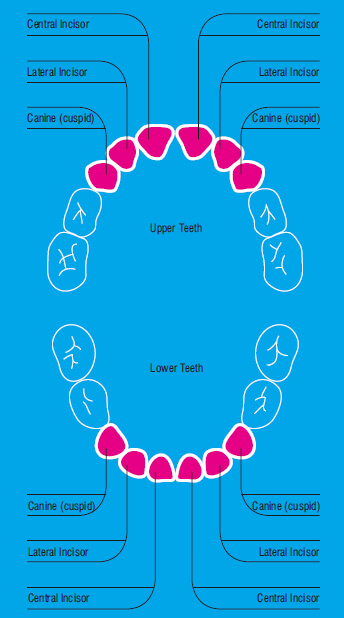
Biohellenika today gives a second chance to children that have not cryopreserved stem cells from the umbilical cord blood to store stem cells from deciduous teeth, which from the age of 5-6 year old are replaced.
These cells today are in experimental studies for regenerative medicine.
The aim of this service is the collection and cryopreservation of the valuable biological source of stem cells for the children that have not collected their stem cells during birth or that have been used for therapeutic purposes. The deciduous teeth that are used for this purpose are highlighted in the following diagram in red.
The service also concerns adults that want to use their wisdom teeth as a source of collection, process and cryopreservation of stem cells for therapeutic use. Furthermore teeth that are extracted for orthodontic purposes can be used for the isolation of stem cells.
The discovery that was done in 2003 from a scientific team of the Department of National Institute of Health of the United States (N.I.H.) gives the opportunity to parents that lost the chance to store their childrens’ stem cells during birth to ask for the preservation of this valuable material that is found in deciduous teeth.
Types of stem cells that are found in the dental pulp.
The deciduous teeth inside contains the dental pulp, which is rich in stem cells. The discovery of these cells open a new field of research, that explores the possibilities of use these cells in therapeutic applications in the near future, in parallel or complementary to those of the umbilical cord stem cells.
Τhe pulp of deciduous teeth contains:
Odontoblasts, the cells which create the pulp and the dentine of the tooth
Mesenchymal stem cells which can be implanted into any other organ or tissue and reinforce its defense and regenerating function
Endothelial cells and also migrating blood cells.
Today is generally acceptable, that stem cells derived from deciduous teeth can have in the near future clinical applications similar to those of the stem cells of the bone marrow and the umbilical cord blood.
Diseases that are intended to be treated with dental pulp stem cells are:
Dental diseases
Pulp regeneration
Development a whole new viable teeth
Dentin regeneration, by fixing the caries
Tissue regeneration
Improvement of cardiac function after heart attack, by stem cell implantation into the infarcted area
Treatment of neurodegenerative diseases
Osteoarthritis, cartilage and fascia regeneration
Bone fracture healing
Use as grafts in Maxillofacial Surgery of jaw or bone defects

